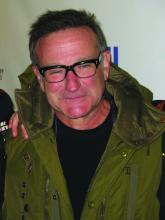Suicides and calls to the National Suicide Prevention Lifeline spiked after the suicide of actor Robin Williams, based on data from calls and website visits before and after his death.
Suicides in the United States tend to follow temporal patterns, with spikes in the spring and early summer, but “some events, including celebrity deaths, serve as ‘shocks’ that disrupt seasonal time trends and may prompt imitation,” wrote Rajeev Ramchand, PhD, of the National Institute of Mental Health, Bethesda, Md., and colleagues in a study published online in the journal Psychiatric Services in Advance (2019 Apr 30. doi: 10.1176/appi.ps.201900007).
The National Suicide Prevention Lifeline (NSPL) experienced a 300% increase in call volume the day after Mr. Williams’ death, however, only 57% of these calls were answered, the researchers said.
The researchers compared daily suicide data, NSPL call volume, and visits to two suicide prevention websites before and after Mr. Williams’ death on August 11, 2014.
Before August 11 in 2012, 2013, and 2014, the average number of daily suicides ranged from 113 to 117; after August 11, 2014, this average spiked to 142, an increase not seen in 2012 or 2013, according to data from the National Center for Health Statistics’ Compressed Mortality File. The NSPL received 12,972 calls on August 12, 2014, following Mr. Williams’ death, compared with a daily average of 4,116 to 6,302 calls during the week before his death. In addition, the Suicide Prevention Resource Center (SPRC), a website that provides technical assistance, training, and suicide prevention material; and Suicide Awareness Voices of Education (SAVE), a website with resources for individuals affected by suicide, as well educational information to raise public awareness, saw significant increases in visits on the day after Mr. Williams’ suicide.
The study findings were limited by several factors including the lack of information on whether calls to NSPL were information seekers or individuals in crisis, the researchers noted. However, the results suggest the need for surge capacity to prepare for increased demand in the wake of a celebrity suicide, they said.
The researchers had no financial conflicts to disclose.
SOURCE: Ramchand R et al. Psychiatric Services in Advance. 2019. doi: 10.1176/appi.ps.201900007 .

